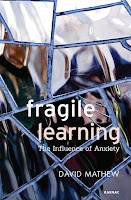Showing posts with label Anxiety. Show all posts
Showing posts with label Anxiety. Show all posts
Fragile Learning: The Influence of Anxiety
What are the barriers and obstacles to adults learning? What makes the process of adult learning so fragile? And what exactly do we mean by Fragile Learning? This book addresses these questions in two ways. In Part One, it looks at challenges to learning, examining issues such as language invention in a maximum security prison, geography and bad technology, and pedagogic fragility in Higher Education. Through a psychoanalytic lens, Fragile Learning examines authorial illness and the process of slow recovery as a tool for reflective learning, and explores ethical issues in problem-based learning.
The second part of the book deals specifically with the problem of online anxiety. From cyberbullying to Internet boredom, the book asks what the implications for educational design in our contemporary world might be. It compares education programmes that insist on the Internet and those that completely ban it, while exploring conflict, virtual weapons and the role of the online personal tutor. The book also examines the issue of time as a barrier to learning and its links to unconscious thinking, as well as defining fragility in a summative essay. Using real-life examples, originality and wit, Fragile Learning is an important contribution to the field of psychoanalysis and pedagogy.
My Age of Anxiety: Fear, Hope, Dread, and the Search for Peace of Mind
As recently as thirty-five years ago, anxiety did not exist as a diagnostic category. Today, it is the most common form of officially classified mental illness. Scott Stossel gracefully guides us across the terrain of an affliction that is pervasive yet too often misunderstood.
Drawing on his own long-standing battle with anxiety, Stossel presents an astonishing history, at once intimate and authoritative, of the efforts to understand the condition from medical, cultural, philosophical and experiential perspectives. He ranges from the earliest medical reports of Galen and Hippocrates, through later observations by Robert Burton and Søren Kierkegaard, to the investigations by great nineteenth-century scientists, such as Charles Darwin, William James and Sigmund Freud, as they began to explore its sources and causes, to the latest research by neuroscientists and geneticists. Stossel reports on famous individuals who struggled with anxiety, as well as the afflicted generations of his own family. His portrait of anxiety reveals not only the emotion’s myriad manifestations and the anguish it produces, but also the countless psychotherapies, medications and other (often outlandish) treatments that have been developed to counteract it. Stossel vividly depicts anxiety’s human toll – its crippling impact, its devastating power to paralyse – while at the same time exploring how those who suffer from it find ways to manage and control it.
My Age of Anxiety is learned and empathetic, humorous and inspirational, offering the reader great insight into the biological, cultural and environmental factors that contribute to the affliction.
See also
7 TED talks on the struggle of mental health
Depression, schizophrenia, suicidal feelings—too often, these experiences stay private. These speakers who’ve struggled with mental illness boldly share their stories, in hopes that others don’t feel so alone.
Andrew Solomon: Depression, the secret we share
"The opposite of depression is not happiness, but vitality, and it was vitality that seemed to seep away from me in that moment." In a talk equal parts eloquent and devastating, writer Andrew Solomon takes you to the darkest corners of his mind during the years he battled depression. That led him to an eye-opening journey across the world to interview others with depression — only to discover that, to his surprise, the more he talked, the more people wanted to tell their own stories. (Filmed at TEDxMet.)
Kevin Breel: Confessions of a depressed comic
Kevin Breel didn't look like a depressed kid: team captain, at every party, funny and confident. But he tells the story of the night he realized that — to save his own life — he needed to say four simple words.
Sherwin Nuland: How electroshock therapy changed me
Surgeon and author Sherwin Nuland discusses the development of electroshock therapy as a cure for severe, life-threatening depression — including his own. It’s a moving and heartfelt talk about relief, redemption and second chances.
Eleanor Longden: The voices in my head
To all appearances, Eleanor Longden was just like every other student, heading to college full of promise and without a care in the world. That was until the voices in her head started talking. Initially innocuous, these internal narrators became increasingly antagonistic and dictatorial, turning her life into a living nightmare. Diagnosed with schizophrenia, hospitalized, drugged, Longden was discarded by a system that didn't know how to help her. Longden tells the moving tale of her years-long journey back to mental health, and makes the case that it was through learning to listen to her voices that she was able to survive.
Elyn Saks A tale of mental illness -- from the inside
"Is it okay if I totally trash your office?" It's a question Elyn Saks once asked her doctor, and it wasn't a joke. A legal scholar, in 2007 Saks came forward with her own story of schizophrenia, controlled by drugs and therapy but ever-present. In this powerful talk, she asks us to see people with mental illness clearly, honestly and compassionately.
JD Schramm: Break the silence for suicide attempt survivors
Even when our lives appear fine from the outside, locked within can be a world of quiet suffering, leading some to the decision to end their life. At TEDYou, JD Schramm asks us to break the silence surrounding suicide and suicide attempts, and to create much-needed resources to help people who reclaim their life after escaping death. Resources: http://t.co/wsNrY9C
Kevin Briggs: The bridge between suicide and life
For many years Sergeant Kevin Briggs had a dark, unusual, at times strangely rewarding job: He patrolled the southern end of San Francisco’s Golden Gate Bridge, a popular site for suicide attempts. In a sobering, deeply personal talk Briggs shares stories from those he’s spoken — and listened — to standing on the edge of life. He gives a powerful piece of advice to those with loved ones who might be contemplating suicide.
Resources for suicide prevention, post-attempt survivors and their families: http://t.co/wsNrY9C
Playlist: The struggle of mental health
The Trauma of Birth by Otto Rank
First published in 1924, Otto Rank's The Trauma of Birth took as its starting point a note that Freud added to his The Interpretation of Dreams : "Moreover, the act of birth is the first experience of anxiety, and thus the source and prototype of the affect of anxiety". Rank set out to identify "the ultimate biological basis of the psychical," the very "nucleus of the unconscious" (p. xxiii). For him this was the physical event of birth, whereby the infant passes from a state of perfectly contented union with the mother to a state of parlous separation via an oppressive experience of asphyxiation, constriction, confinement in the vaginal canal, and so on-all feelings recognizable in anxiety states of every kind. It was the struggle against this traumatic experience of birth, in Rank's account, that structured the fantasy life of the child, including the disavowal of the difference between the sexes, infantile sexual theories, and oedipal scenarios. Castration anxiety was a defensive derivative of the anxiety associated with the birth trauma.
Subscribe to:
Posts (Atom)
 |
| Bartleby, the Scrivener: “I would prefer not to.” |






